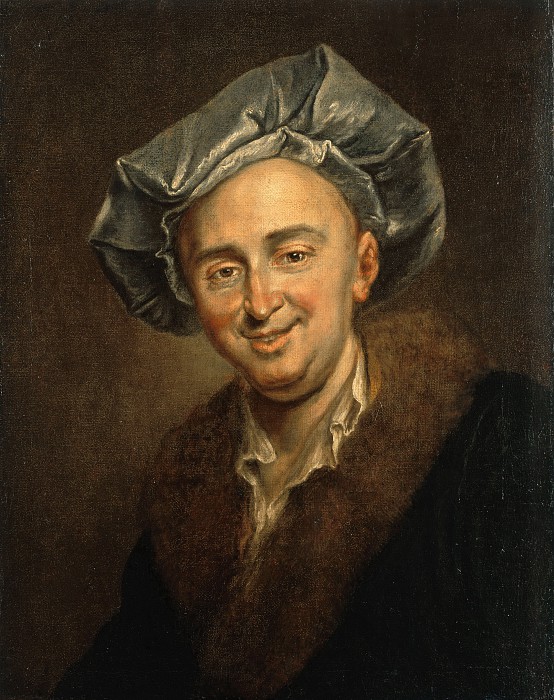Julien Offray de La Mettrie frasi celebri
Origine: L'uomo macchina, pp. 201-202
Origine: L'uomo macchina, p. 201
Origine: L'uomo macchina, p. 204
Origine: L'uomo macchina, pp. 191-192
Julien Offray de La Mettrie: Frasi in inglese
Origine: The Natural History of the Soul (1745), Ch. VI Concerning the Sensitive Faculty of Matter
“[T]he, diverse states of the soul are always correlative with those of the body.”
p, 125
Man a Machine (1747)
“But this opinion is but an hypothesis which he tried to adjust to the light of faith”
Origine: The Natural History of the Soul (1745), Ch. V Concerning the Moving Force of Matter
Contesto: Descartes, a genius made to blaze new paths and to go astray in them, supposed with some other philosophers that God is the only efficient cause of motion, and that every instant He communicates motion to all bodies. But this opinion is but an hypothesis which he tried to adjust to the light of faith; and in so doing he was no longer attempting to speak as a philosopher or to philosophers. Above all he was not addressing those who can be convinced only by the force of evidence.<!--p.158
“This is then another new faculty which might exist only potentially in matter, like all the others”
Origine: The Natural History of the Soul (1745), Ch. VI Concerning the Sensitive Faculty of Matter
Contesto: [W]e must admit, with the same frankness, that we are ignorant whether matter has in itself the faculty of feeling, or only the power of acquiring it by those modifications or forms to which matter is susceptible; for it is true that this faculty of feeling appears only in organic bodies.
This is then another new faculty which might exist only potentially in matter, like all the others which have been mentioned; and this was the hypothesis of the ancients, whose philosophy, full of insight and penetration, deserves to be raised above the ruins of the philosophy of the moderns.<!--p.160
“We have now but to prove a third attribute: I mean the faculty of feeling”
Origine: The Natural History of the Soul (1745), Ch. VI Concerning the Sensitive Faculty of Matter
Contesto: We have now but to prove a third attribute: I mean the faculty of feeling which the philosophers of all centuries have found in this same substance.... [T]he Cartesians have made, in vain, to rob matter of this faculty. But in order to avoid insurmountable difficulties, they have flung themselves into a labyrinth from which they have thought to escape by this absurd system "that animals are pure machines."
An opinion so absurd has never gained admittance among philosophers... Experience gives us no less proof of the faculty of feeling in animals than of feeling in men.
Man a Machine (1747)
Contesto: Among animals, some learn to speak and sing; they remember tunes, and strike the notes as exactly as a musician. Others, for instance the ape, show more intelligence... would it be absolutely impossible to teach the ape a language? I do not think so.<!--pp.100-102
“If there is a revelation, it can not then contradict nature.”
p, 125
Man a Machine (1747)
Origine: The Natural History of the Soul (1745), Ch. VI Concerning the Sensitive Faculty of Matter
“One needs only eyes to see the necessary influence of old age on reason.”
p, 125
Man a Machine (1747)
Origine: The Natural History of the Soul (1745), Ch. V Concerning the Moving Force of Matter
Origine: The Natural History of the Soul (1745), Ch. V Concerning the Moving Force of Matter, p.156
“The soul follows the progress of the body, as it does the progress of education.”
p, 125
Man a Machine (1747)
Preface, Oeuvres philosophiques de Monsieur de La Mettrie (1764) as quoted by Paul Carus, The Mechanistic Principle and the Non-mechanical (1913) p. 102. https://books.google.com/books?id=wGNRAAAAYAAJ&pg=PA102
Origine: The Natural History of the Soul (1745), Ch. VI Concerning the Sensitive Faculty of Matter
Origine: The Natural History of the Soul (1745), Ch. III Concerning the Extension of Matter
Gen. i; Is. lxvi
Origine: The Natural History of the Soul (1745), Ch. V Concerning the Moving Force of Matter
“A good prescription is still more profitable than an absolution.”
(c. 1734) in a successful argument to persuade his father that a medical education was preferred. As quoted by Friedrich Albert Lange, History of Materialism and Critique of its Present Importance Tr. Ernest Chester Thomas (1882) 2nd edition, Vol. 2, p. 55. https://books.google.com/books?id=X4pQAAAAYAAJ&pg=PA55
